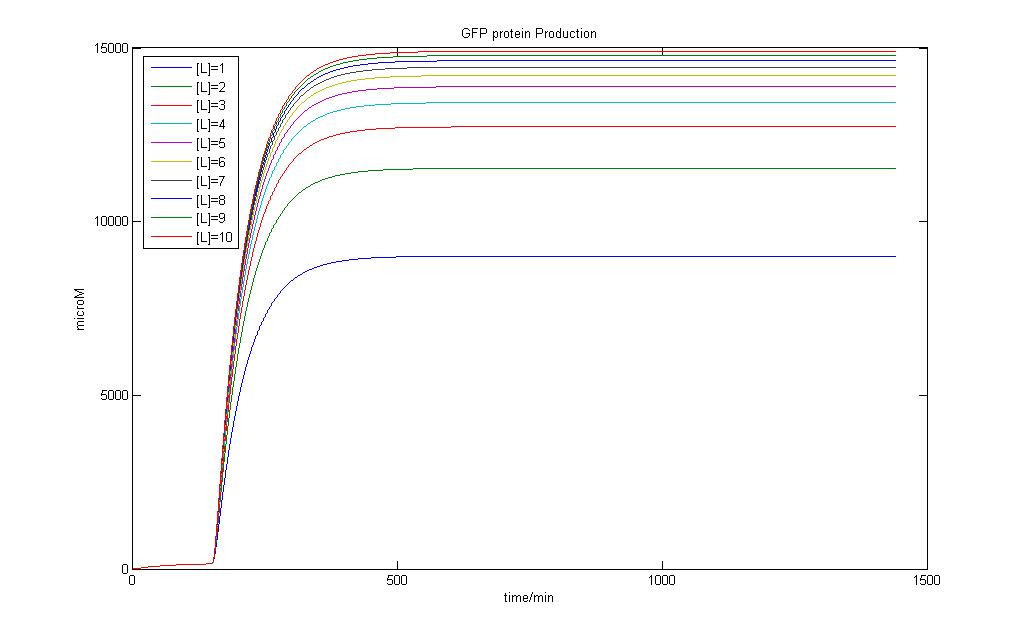|
|
| Line 12: |
Line 12: |
| | | | |
| | | | |
| - | =System=
| |
| - | The system can be viewed as two parts. The first part comprises of lactose induced production of colicin E7 and the immunity protein. The second part comprises of a detection mechanism that produces the lysis protein upon the detection of both Iron ions and Ai-2 ( Autoinducer 2).
| |
| | | | |
| - | ==Constructs of the system==
| |
| - |
| |
| - | ===Constitutive Protein Synthesis===
| |
| - | {| align="center" border="1"
| |
| - | |[[Image:Protein production.JPG|300px|Constitutive transcription]]
| |
| - | |[[Image:Protein_synthesis.jpg|650px|Constitutive transcription results]]
| |
| - | |}
| |
| - |
| |
| - | The constitutive model allows us to understand how fast steady state can be achieved for basal transcription.
| |
| - | ===AND Gate===
| |
| - | {| align="center" border="1"
| |
| - | |[[Image:Andgate.JPG|300px|AND gate]]
| |
| - | |[[Image:Andgate_results.jpg|650px|AND gate results]]
| |
| - | |}
| |
| - |
| |
| - | Addition of inputs was done at 250 minutes.
| |
| - |
| |
| - | The AND gate model allows us to observe that even when there is no input, basal transcription still yields a certain amount of product. The difference is observed both inputs are applied and a sharp increase over the basal amount can be easily observed.
| |
| - |
| |
| - | We can observe AND gate behaviour in this sense as it is impossible to have no protein production at all even in the most well-regulated system.
| |
| - |
| |
| - | ===Complex Formation===
| |
| - |
| |
| - | [[Image:Complex.JPG|400px|Complex Formation]]<br>
| |
| - | This is the Simulink Model Construct for Complex Formations. The model is tested by applying an input when time = 150 min.
| |
| - | [[Image:ComForm_Input.jpg|750px|Vary Input]]<br>
| |
| - | By increasing the input, we can see an increase in the amount of complex formed.
| |
| - | [[Image:ComForm_Rate.jpg|750px|Vary Rate]]<br>
| |
| - | By changing the rate of Complex formation, we can also see a change in the amount of complex formed.
| |
| - |
| |
| - | Both results show that the model works fine and can be used in our modeling exercises later on.
| |
| - | ===Regulated Transcription===
| |
| - | The model for regulated transcription is compared with the model used in Constitutive transcription. Input into both models was done when time = 150 min. This would allow us to see if there is a difference under two different conditions for the two models.
| |
| - | [[Image:R&C_150_1.jpg|600px|150 minutes]]<br>
| |
| - |
| |
| - | [[Image:R&C_300_1.jpg|600px|300 minutes]]<br>
| |
| - |
| |
| - | [[Image:R&C_150_2.jpg|600px|150 minutes]]<br>
| |
| - |
| |
| - | [[Image:R&C_300_2.jpg|600px|300 minutes]]<br>
| |
| | ===Lactose Induced GFP production=== | | ===Lactose Induced GFP production=== |
| | [[Image:GFP_LACTOSE.jpg|850px| GFP Production Model]] | | [[Image:GFP_LACTOSE.jpg|850px| GFP Production Model]] |
Introduction
The use of models to describe synthetic biology has its merits. Synthetic biology investigates the use of different biological parts to put together and assemble devices that carry out specific functions. Good mathematical models to describe each part would greatly help not only in the characterization of a part but also facilitate the use of the part by other people when they choose to use the part within their devices or systems.
Simulations based on modeling can give a first insight on how the system would turn out and provide a rough guide of the system’s behaviour.
Lactose Induced GFP production

 "
"

